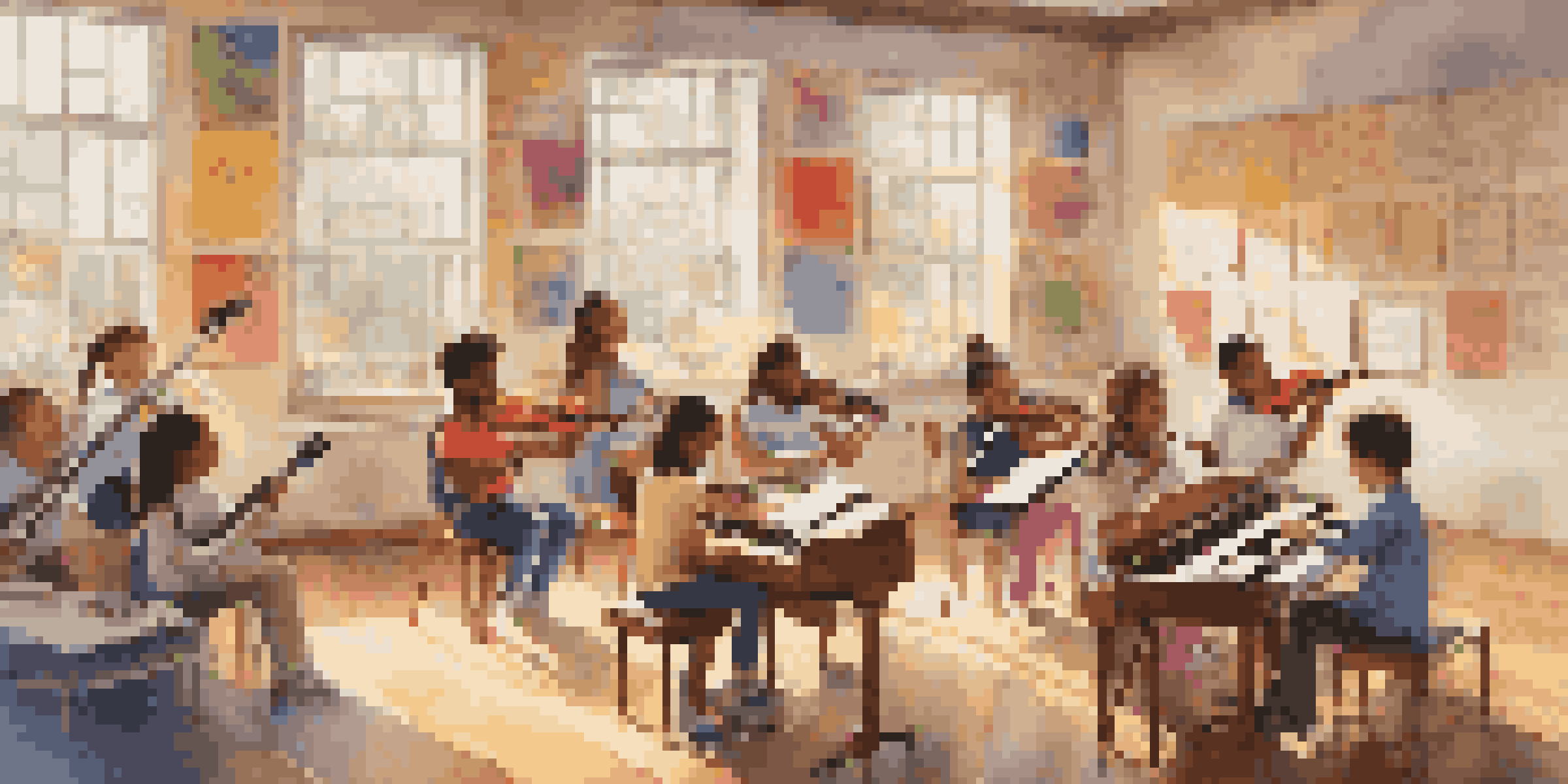Utilizing Music Education to Support Social-Emotional Learning Goals

Understanding Social-Emotional Learning (SEL) Basics
Social-Emotional Learning, or SEL, involves developing skills to understand and manage emotions, set positive goals, and establish supportive relationships. It’s crucial for students to navigate the complexities of their feelings and the world around them. By integrating SEL into educational practices, we can foster a more empathetic and collaborative environment in schools.
Music can change the world because it can change people.
Imagine SEL as the foundation of a house—without it, everything else built on top can crumble. Students who possess strong emotional intelligence are often more successful academically and socially. They are better equipped to handle stress, resolve conflicts, and build meaningful connections with peers.
Music education serves as a powerful vehicle for advancing these SEL objectives, offering a creative outlet for expression and connection. Through music, students not only learn about rhythms and melodies but also about empathy, teamwork, and self-regulation.
The Emotional Impact of Music Education
Music has a unique way of resonating with our emotions, making it an ideal tool for teaching SEL. When students engage in music, they often experience a range of feelings—from joy to sadness—which helps them articulate and process their own emotions. This emotional engagement is key in developing self-awareness, one of the core components of SEL.

Consider how a song can transport you back to a specific moment in time, evoking memories and feelings. By exploring different genres and lyrics, students learn to connect their personal experiences with broader human emotions. This practice encourages them to reflect on their feelings and understand others better.
SEL Builds Emotional Intelligence
Social-Emotional Learning (SEL) equips students with the skills to understand and manage their emotions, fostering empathy and collaboration.
Additionally, group music activities, such as choir or band, foster a sense of belonging and community. Students learn to support one another, enhancing their social skills and building emotional resilience in the process.
Music as a Tool for Building Empathy
Empathy is at the heart of effective communication and relationships. Music education encourages students to listen actively and appreciate diverse perspectives through various musical traditions and genres. This exposure broadens their understanding of different cultures and fosters a sense of respect and appreciation for diversity.
Education is not the filling of a pail, but the lighting of a fire.
For instance, when students study music from around the world, they gain insight into the stories and emotions behind those compositions. This not only enriches their musical knowledge but also cultivates an empathetic mindset. They start to see the world through others' eyes, experiencing life beyond their own circumstances.
Class discussions about the meanings behind songs can further enhance this process, allowing students to express their interpretations and feelings. These conversations create a safe space for sharing personal stories, deepening connections among classmates.
Fostering Collaboration through Group Music Activities
Group music activities, such as ensemble performances, require students to work together harmoniously. This collaboration fosters essential social skills, including communication, compromise, and teamwork. When students perform in a group, they learn the importance of listening to one another and adjusting their contributions for a cohesive sound.
Think of it like a well-orchestrated sports team; every player has a unique role but must work together to achieve a common goal. This dynamic not only bolsters their social interactions but also teaches them the value of collective effort and support. As they create music together, they build trust and a sense of camaraderie.
Music Enhances SEL Development
Music education serves as a powerful tool for advancing SEL by promoting self-awareness, empathy, and social skills through emotional engagement.
Moreover, overcoming challenges in group settings, like synchronizing during rehearsals, enhances problem-solving skills. These experiences are invaluable as they prepare students for future collaborative endeavors in various aspects of life.
Enhancing Self-Regulation through Music Education
Self-regulation, the ability to manage one’s emotions and behavior, is a vital component of SEL. Music education can help students develop this skill through structured practices that require discipline and focus. For example, learning an instrument involves setting goals, practicing regularly, and reflecting on progress.
When students engage in focused practice sessions, they learn to control their impulses and stay committed to their goals. This process mirrors the challenges they face in everyday life, teaching them perseverance and patience. The discipline gained from music education translates into other areas, enhancing overall self-regulation.
Additionally, music often requires students to be mindful and present, whether during a performance or practice. This mindfulness helps them to stay grounded, manage stress, and improve their emotional responses to various situations.
Building Confidence through Performance Opportunities
Performing in front of an audience can be a daunting experience for many students, but it also serves as a powerful confidence booster. Music education provides numerous opportunities for students to showcase their skills, whether through concerts, recitals, or school events. Each performance helps them confront their fears and build self-esteem.
Think of a musician stepping onto the stage—there’s a mix of excitement and nervousness. As they perform, they gain a sense of accomplishment that reinforces their belief in their abilities. This confidence spills over into other areas of their lives, empowering them to take risks and tackle challenges head-on.
Collaboration Through Music Activities
Group music activities cultivate essential teamwork skills, allowing students to learn the value of cooperation and trust in achieving common goals.
Moreover, supportive feedback from peers and teachers during performances helps students recognize their strengths and areas for improvement. This constructive criticism fosters a growth mindset, encouraging them to view challenges as opportunities for learning rather than obstacles.
Integrating Music with SEL Curriculum for Lasting Impact
To maximize the benefits of music education for SEL, educators can integrate music into the broader curriculum. This means creating lessons that combine music with social-emotional concepts, allowing students to explore these themes in depth. For instance, a lesson could focus on the emotions conveyed in a particular piece, prompting discussions about feelings and experiences.
Integrating music with SEL not only enhances engagement but also reinforces the lessons learned in both areas. Students can see firsthand how music relates to their emotions, relationships, and daily challenges. This interconnected approach nurtures a holistic understanding of their social and emotional development.

Ultimately, by embedding music education within the SEL framework, schools can create vibrant, inclusive environments where students thrive, both emotionally and academically. This synergy cultivates well-rounded individuals equipped to navigate life's complexities.